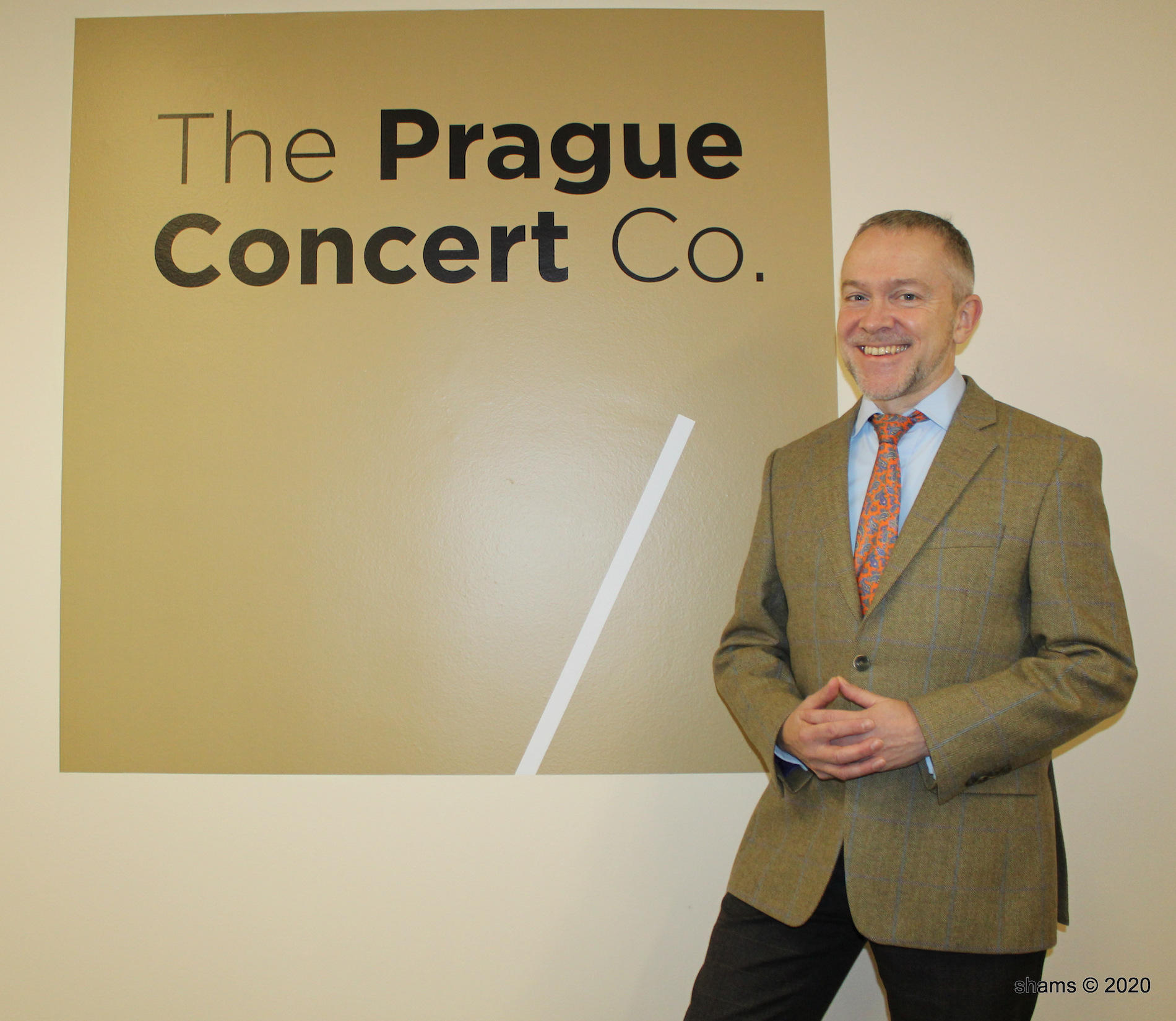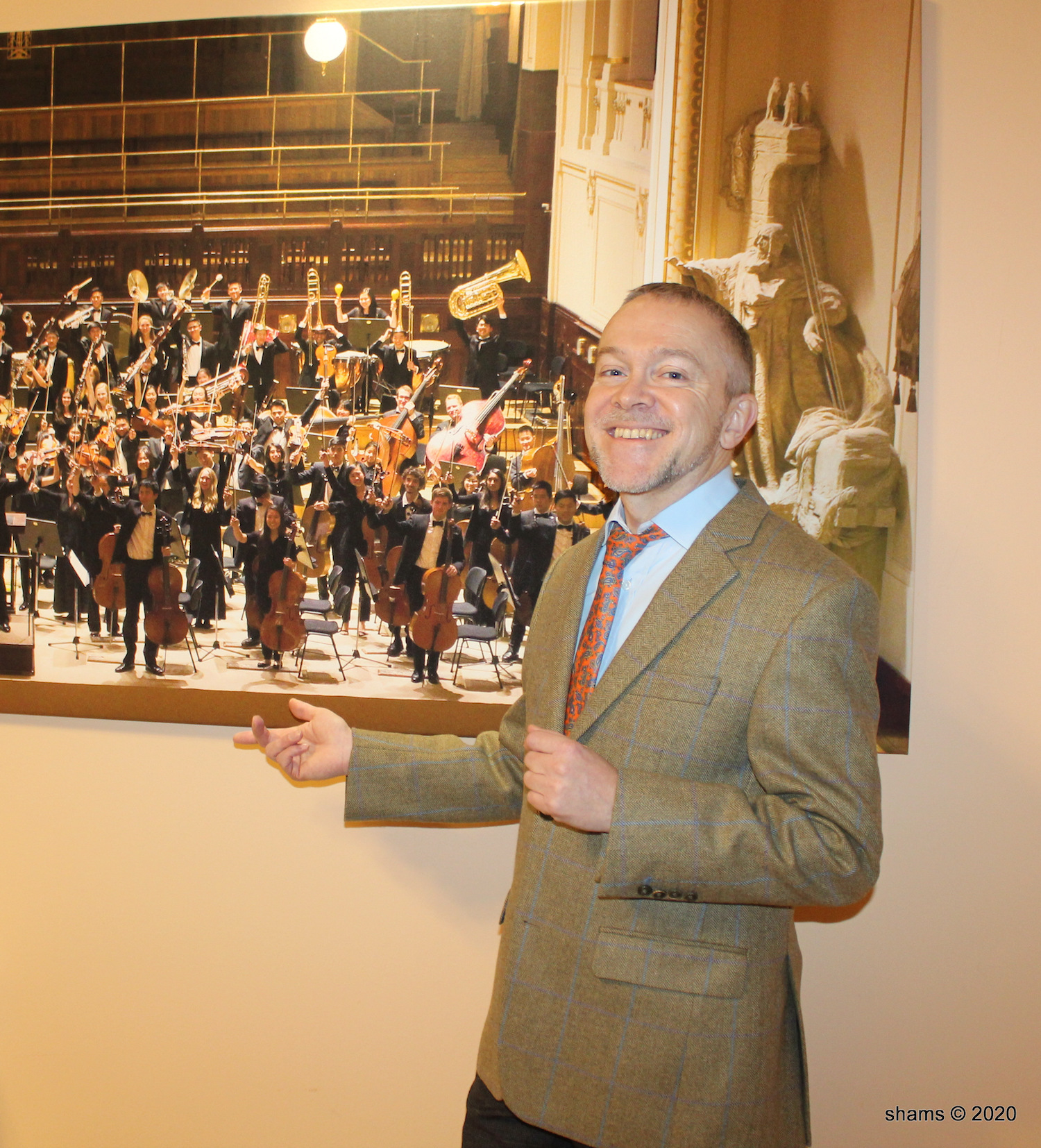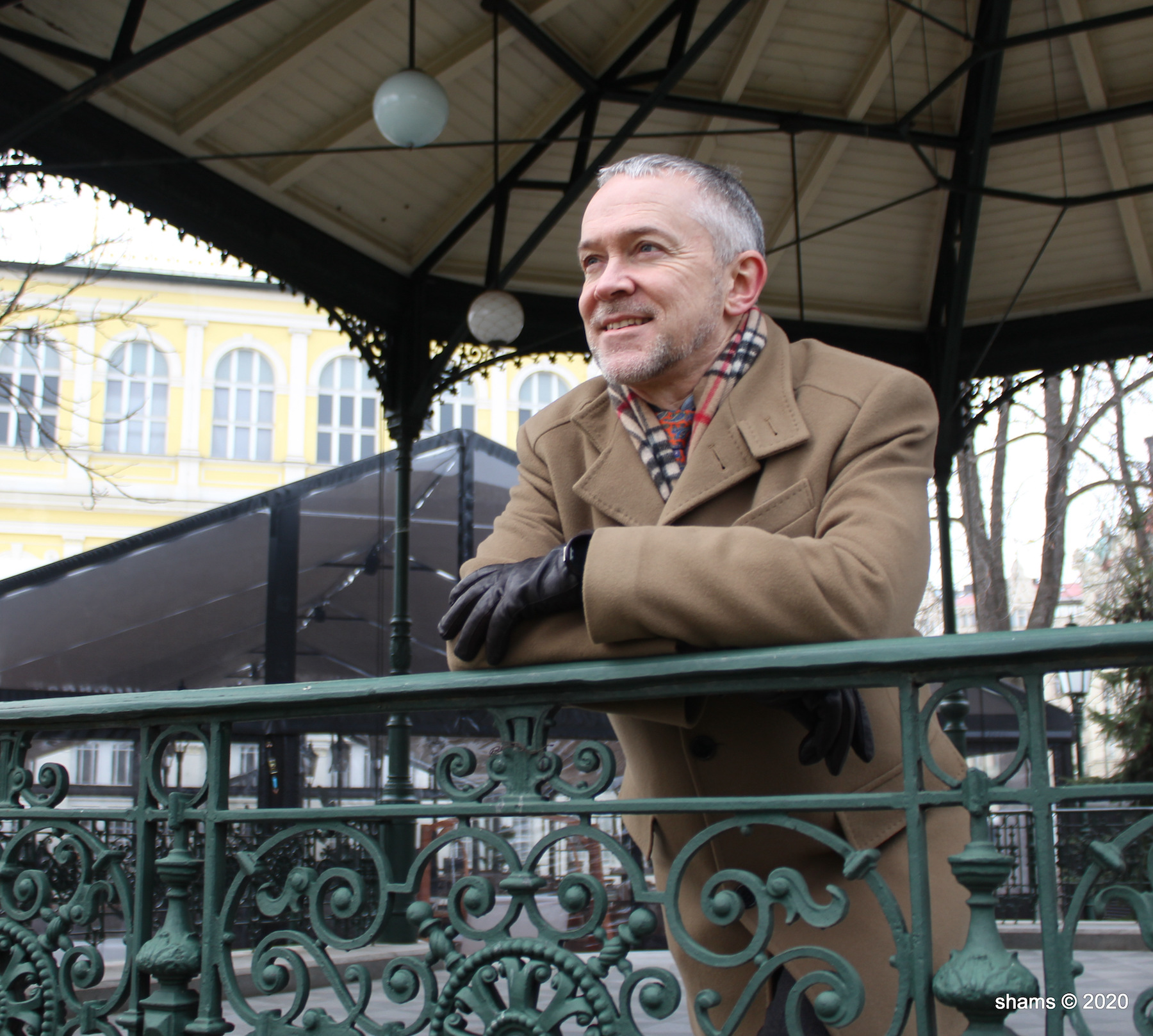“I remain an OPTIMIST”

John Tregellas, Director of The Prague Concert Co.
I first spoke with John Tregellas for Leaders Magazine in the autumn of 2016. We discussed the 20th anniversary of The Prague Concert Co., the energy of young orchestras and the international WASBE Conference.
This interview had a number of consequences. I became a member of the Concert Club, the agency began co-operating with a number of new music ensembles, and the idea of a niche department focused on visiting exclusive artistic venues and arranging unique culture, art or architecture trips in Central Europe was hatched, to be named Beyond Classic Travel. We began setting plans for a further interview during the course of the first. In the meantime, John celebrated thirty years since his arrival in then-Czechoslovakia and the start of his successful business organising concert tours and music festivals, and he also became a Czech citizen. Our second interview again took place in the Czech language. In 2020, The Prague Concert Co. had planned a record 160 concerts, almost double the number compared to 2016… and we all know what happened next. On a side note, did you know that it is much more difficult to cancel a planned concert tour than it is to set one up?
Not even during a period of crisis when it is hard to plan for the future and arrange new tours, partly because choirs and large ensembles are unable to practise, have John and his team sat back or given up. They are supporting charities, setting up new projects, testing the use of on-line technologies and offering their capabilities and knowledge for companies to make use of. And they’re looking forward to 2022.
When were you last at a concert? I’m asking because thanks to you and your Concert Club, I know exactly. My family and I managed to catch the final concert on 8 October in the Municipal House. It was Ludwig van Beethoven’s Symphony No. 7. The audience attempted to compensate for their limited number by giving a standing ovation. We all felt sad that we were going to have to say goodbye to live culture.
I was at a concert the evening before last. You can probably guess that it was a concert which was held “online”. Our colleague, Jan Špalek, was performing “live” for Obývák.tv, so I got an invite. So I was able to check the technical aspect of this type of broadcast, which now seems to offer an alternative. And of course we are also asking ourselves whether one can generate income in this way.
I’ll clarify my question then. I hadn’t realised how ambiguous things are today. When were you last at a concert in a concert hall?
As an agency, we held our last live concert in early October in the Gothic Hall in Tábor. This was part of a new project in which we are organising trips to concerts outside Prague for members of the Concert Club, giving them the opportunity to experience less well-known venues. I concur with you about the atmosphere: it really was incredible. We were all so happy  we had been able to make the concert a reality.
we had been able to make the concert a reality.
Do you think that people began to appreciate art and culture more following the first wave of the pandemic?
I certainly noticed that there was a proverbial hunger for live culture during the first lockdown, whether in regard to music or theatre. The current second lockdown is no different. Visiting concerts or the theatre is an inherent part of the lifestyle in the Czech Republic. Notice how many people have a season ticket for their favourite concert ensemble or theatre, or instead seek out new performances by various smaller experimental theatre groups. People are missing that now. The cultural sector is without doubt one of the most affected in the Czech Republic. Examples of restaurants, bars and pubs are often discussed in the media. But the economic nature of restaurant establishments is different. There are many freelancers within culture who do a number of jobs involving performance, teaching and creative work. The question is to what extent the government’s different emergency support programmes are geared towards such artists.
That leads on nicely to my next question. A global movement has been set up under the motto “Art is Work” to support these musicians. Berlin’s Deutsches SymphonieOrchester, led by Simon Rattle and Magdalena Kožená, called attention to their colleagues’ situation by streaming a concert free-of-charge.
Some might have the idealised impression that artists do their profession purely out of enthusiasm, and that their gift comes from God. For an artist, art is both a calling and a way of making a living. Artists have to support their family, pay their mortgage and buy food too. And as I’ve said, for the authorities, combining a number of smaller part-time roles may be less tangible than the situation, for example, of a specific hotel whose owner can ask for compensation according to the number of unoccupied beds. Speaking of compensation, if our agency had specifically tried to come up with a combination of activities worst affected by the pandemic we couldn’t have done better than the reality. We work at the interface between international travel and tourism, and organising mass cultural events with a large number of participants. The orchestras we represent commonly have around 100 members and mainly come from overseas, and our concerts are usually attended by over 500 visitors.

How are you and your partners experiencing the current pandemic?
I remain an optimist. One day, the pandemic will pass. But the immediate impact on our season has been devastating. We had to cancel 60 tours comprising 160 concerts in various phases of preparation. We managed to implement one trip in February. More groups were meant to arrive on 13 March this year. We had to cancel one tour just two days before it was due to begin. It turned out that cancelling all the contracted hotels, services, preparation and concert performances involved a much greater volume of work than actually setting the tour up. And for twice the amount of work, we get zero income. Looking soberly at the situation, I think it’s still going to be a long time before culture gets back to normal.
You’re not planning a 2021 season then.
It’s not a realistic option. Our tours are planned a year to nine months in advance. Furthermore, we specialise in choirs and large orchestras, which under current conditions cannot even rehearse. So they have no way to prepare new repertoire, much less plan for international performances. In order for tours to be able to begin again, the situation in the source country and target country must have stabilised, and travel between both countries must be safe. None of these conditions is met at the current time. The United States, where the largest number of our music ensembles come from, is currently in the worst position in terms of this pandemic. Our target countries are the Czech Republic and its neighbours. You can see for yourself how the situation is unstable, and travel remains restricted. Many entities, whether commercial or subsidised, are asking themselves how they can operate over the coming year. Our strategy must involve finding viable ways to survive this period, economically and personally, so we can resume normal activities once the epidemiological situation allows us to do so.
They say crises test relationships. Not just in romance, but also in business.
I consider The Prague Concert Co.’s relationships as both business and personal in nature. We’ve been operating on the market for over 25 years, and we’ve worked for many years with lots of different partners. Suddenly you’re faced with the question of how they’re going to respond to the cancellation of ordered services perhaps two or three days beforehand. How do we approach this? It was a real test of the ethical dimension of doing business. We could have taken a strict line, in accordance with our contracts, but that would also have led to huge problems. We chose a benevolent strategy, and endeavoured to handle our relationships so that we could all get through this crisis together. I’m pleased that we managed to agree on a mutually acceptable approach for the vast majority of our suppliers and customers.
Because my son sings in the prestigious boys’ choir, Pueri Gaudentes, I know that you can’t rehearse online. On the other hand, online music streaming is probably going to become increasingly common. Are we going to be visiting concerts in our living rooms in slippers, snacking on crisps in tracksuit bottoms while the Czech Philharmonic plays to us?
First to rehearsing. I myself sing in a choir, and I know that there is no software out there yet allowing for comfortable rehearsing together. All those many recordings which have been produced as if via Zoom have been pasted together from the individual performances of individual singers. The outcome, however, is the result of many hours and days of work by many people behind the scenes. In regard to streaming, I think it’s similar to e-books. E-books have not entirely replaced actual ones. People want to go to concert halls and theatres. They want to share the emotional experience with others. If that wasn’t the case, then the TV would be all we need. There have been recordings of concerts and broadcasts from top opera houses and theatres around the world for many years now. But people still visit those cultural sanctuaries. Online broadcasts are a temporary solution. Every organisation wants to make itself known, to prepare for its return. For orchestras, it’s a logical and meaningful step, but it’s not a replacement.
Thank you for reassuring me that I’ll be able to put on my dress, jewellery and heels again. I also dream of being able to put on my makeup without worrying about what my facemask will do to it.
It remains to be seen to what extent online broadcasts will stay as perhaps a complementary option to a traditional concert. This method of transmission can convey the experience to people who would not otherwise visit a concert hall, whether for medical or other, perhaps financial, reasons. Concert streaming will become the norm. The question is whether everything will remain free-of-charge. In this respect, that wellknown saying that where there is a crisis there is an opportunity applies. And for orchestras, it offers the opportunity to expand their audience to incorporate listeners and supporters from literally around the world. The Berlin Philharmonic has been offering a paid digital subscription for many years now. New York’s Metropolitan Opera is known for livestreaming performances to cinemas around the world.
Our agency is also testing various technological solutions like livestreaming. Orchestra fans, and their parents and families, can watch the performance of their favourite ensemble from the other side of the planet. I’m not saying I’m grateful to the pandemic, but it has really forced us to consider opportunities we had not previously made use of.
How is the pandemic affecting the composition of the ensembles you represent? Are enthusiasts going to have to make do with local groups for some time? And what is the Prague Concert Co. focusing on next year?
It’s not just the pandemic, but also Brexit, which is going to play a role. If orchestras in Great Britain are coming with their instruments, we’re going to have to deal with duties and customs clearance again. We’ve already discussed large overseas orchestras as being “problematic” from the organiser’s perspective. The risk of organising a tour for a large orchestra from New York is epidemiologically greater than for a chamber ensemble from Switzerland, for example. So yes, we’ll first begin with performances by smaller ensembles from neighbouring countries.
We showcased our Musica Orbis concert series to the members of our Concert Club, now numbering over 4000, in virtual form. It didn’t involve a livestream, but rather words accompanying the programme with a link to video recordings of those ensembles who were originally to perform live as part of the series of concerts. We are also sending recommendations for the cultural events of other organisations which are being held virtually. Our members are extremely loyal, often from at-risk age groups, and we wanted to give them a service at a time when some of them may not even have been able to leave their homes. In summer, when there were live performances, we also helped to promote the concerts of other organisers. We truly appreciate our Concert Club members, one reason being that they can respond rapidly and often it is their interest which helps to fill up the remaining empty seats in halls.
In the beginning you mentioned our Beyond Classic Travel brand, which we are also going to continue to focus on. We are able to satisfy highly specific requirements. For example, we can organise a special trip on the theme of Portrait Paintings in Bohemia, including visits to private collections, or set up a weekend programme looking at Czech interwar architecture, with expert commentary. Such cases involve small groups, and we anticipate their resurgence and market interest sooner than for the production of large musical ensembles.

You said that you’re looking forward to 2022.
Yes. If everything goes well, that’ll be the year when we go back to full operation, and we’re already planning numerous attractive events. The pandemic caught us at a time when we had completed the first year of the Musica Orbis Prague Festival, an international classical music competitive festival which is open to orchestras and choirs from around the world. In 2021, the festival will probably be held online. Artists need to hear praise or criticism of their skills, and we will give them this, if in virtual form. I consider this online execution as a step towards restoration of the live festival in 2022.
And 2022 will also see the global WASBE (World Association for Symphonic Bands and Ensembles) Conference, which takes place every other year (because of the pandemic, this time it will be held three years after the last one). This association is admirably represented in the Czech Republic by Col. Václav Blahunek, Chief Conductor of the Band of the Castle Guards and the Police of the Czech Republic. The third week of July 2022 will showcase the best symphonic wind music ensembles from around the world, headed by the US Marine Band. The event, which traditionally attracts several thousand visitors from abroad, will be held at Žofín Palace. It will be a wonderful opportunity for bands which have had to interrupt their normal operation to once again showcase what they can do live. And we trust that Prague will be the best venue for them to appear. And it’ll also be a great opportunity to restore travel and tourism services in Prague. We’re looking forward to working with all the major institutions and stakeholders involved in supporting travel and tourism. This major international event offers Prague and the Czech Republic the opportunity to show itself in the best light once again.
Finally, I would like to thank all devotees of culture who continue to support it in whatever form. The entire The Prague Concert Co. team also deserves great appreciation and respect for having done their best in coping with the current situation and, in line with our company culture, offering support wherever it is needed. We have continued our close relationship with the Cesta domů (hospice) organisation, gardened in care homes, and at least half of our team has completed a Czech Red Cross First Aid course, and spend part of their working week providing support to the elderly. We are also open to participation in new projects. I am proud of our team and I would like to ensure that they have something worthwhile to do until we resume normal service. Another of our initiatives is to organise some great company programmes bringing music and teambuilding together. There are so many interesting parallels – through various rhythmic activities you can help to tune and harmonise your team, and you can grow its creativity by forming an orchestra out of different unconventional instruments. And there are many parallels between conducting an orchestra or choir and managing a team. Definitely give us the opportunity to help you!
By Linda Štucbartová
Photo: Jitka Tomečková


[…] John Tregellas, director of The Prague Concert Co., was interviewed by a reporter of the Czech & Slovak Leaders Magazine about the life in agency during the pandemic, broadcasting concerts online, future plans and much more. Read the article here. […]